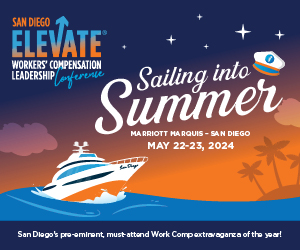Industry Insights
February 2, 2021
Duff: Is the Accident Element of Workers' Compensation Itself a Historical Accident?
- National
- - 0 shares
As I commence another semester teaching workers’ compensation law, blissfully if artificially abstracted from COVID contexts, I find myself befuddled by a fundamental and, I naïvely had imagined, simple question: Why did state workers’ compensation statutes ever include an accident requirement?
 As workers’ compensation specialists know, the standard workers’ compensation coverage formula (in most but not all states) is something like, “Incapacity for work is covered if resulting from a personal injury by accident arising out of and in the course of employment.”
As workers’ compensation specialists know, the standard workers’ compensation coverage formula (in most but not all states) is something like, “Incapacity for work is covered if resulting from a personal injury by accident arising out of and in the course of employment.”
Many insiders understand that functionally, the formula has operated historically to exclude certain categories of arguably work-related injuries — notably cumulative and repetitive injuries, and disease. Often, courts will dramatically remind readers that workers’ compensation was never meant to be “general health insurance.”
Yet states that have foregone the accident requirement altogether — e.g., Massachusetts, Maine, Wyoming — do not somehow reject workplace causal connection as a requirement for coverage, so the “general health insurance” quip is somewhat hyperbolic.
Under black-letter workers’ compensation law, an “accident” is an event that occurs “unexpectedly” at a “definite time” (or something of the like). Where the accident concept is applicable, the law can (and does) complicate matters by (depending on the state) asking whether by “unexpected” one means that the cause of the injury was unexpected, or that the result/disability was unexpected.
Courts also ask whether by “definite time” one means that the injury occurred at a definite time or that the out-of-work disability occurred at a definite time. The questions are prickly, and states’ laws on these conceptual rivulets are often inconsistent. I will be pushing my students on the “stickiness” of this doctrine in the upcoming week.
But I have a different question that I am thinking about. The “injury by accident” language came to the American statutes from the original English workers’ compensation statutes of 1897 and 1906. I am beginning to think the purpose of the “accident” language was not to limit coverage of workers’ compensation claims but to provide notice of expanded employer liability, to make clear that even though the injury was “merely” an accident — and therefore not actionable in negligence — the worker nevertheless had a "claim" (an unusual proposition in 1897). In the language of the old 1906 English statute at Section 1:
If in any employment to which this act applies personal injury by accident arising out of and in the course of the employment is caused to a workman, his employer shall, subject as herein-after mentioned, be liable to pay compensation in accordance with the First Schedule to this act.
But the exclusion of nonaccidental injury takes on quite a different tenor when one considers that it is being juxtaposed to negligence. In the same section the statute reads:
When the injury was caused by the personal negligence or wilful act of the employer, or of some person for whose act or default the employer is responsible, nothing in this act shall affect any civil liability of the employer, but in that case the workman may, at his option, either claim compensation under this act, or take the same proceedings as were open to him before the commencement of this act; but the employer shall not be liable to pay compensation for injury to a workman by accident arising out of and in the course of the employment both independently of and also under this act, and shall not be liable to any proceedings independently of this act, except in case of such personal negligence or wilful act as aforesaid.
So the prototypical English act contemplated that a worker injured by accident had a workers’ compensation claim. But it also went on to say that non-accidentally injured workers (or their statutory successors, in the case of death) could elect to pursue their employers in negligence (“civil liability”). The employee could not pursue both courses of legal action, and exclusivity applied except in the case of the employer’s “personal negligence” or “willful act.”
Read in this way, the term “accident” was simply acting as a foil to “negligence.” It had no independent significance as an exclusionary or “cost controlling” device.
It is true enough that the original architects of the language probably only had on their minds coverage of single-episode, traumatic workplace injuries. But it is difficult to draw from this fact that they meant not to cover cumulative injuries. And precisely because cumulative injuries were not being considered, it is difficult to imagine that the “accident” element was originally meant to exclude them (or anything like them).
Maybe this does have a COVID connection. To the extent that COVID claims are deemed not to be covered by workers’ compensation (as occupational diseases or otherwise) because contraction is not an “accident” (leaving causation questions to one side), it is questionable that non-coverage is consistent with “what workers’ compensation was originally meant to be."
The accident requirement (functionally an exclusion) may simply be a reflexive carryover from the original statute that we have not critically thought about, at least not critically enough. Who will be the last to die for a historical accident?
Michael C. Duff is associate dean for student programs and external relations, and is professor of law, at the University of Wyoming College of Law. This entry is republished from the Workers' Compensation Law Professors blog, with permission.
Advertisements
Columns
- Montgomery: Sedgwick Tries PPO Discount for Med-Legal (Again) 04/19/24
- Kamin: More Policy Exclusions Would Reduce Losses 04/18/24
- Phillips: It's All Settled 04/17/24
- Snyder: Public Benefit Rules Have Changed, but It Might Not Make a Difference 04/12/24
- Headrick: Clearing Up a Common Misconception 04/11/24
- Snyder: Litigation Guidelines Should Define Four Settlement Triggers 04/10/24
- Kirsch: Depositions of Comp Carrier Employees After Intervening in Third-Party Actions 04/09/24
- Wilson and Bennett: Could AI Have Prevented the Opioid Crisis in Workers' Comp? 04/08/24
- Moore: Pandemic Effect Over in March 2027. Really? 04/05/24
- Geaney: A Brief History of Our State's Workers' Compensation Act 04/04/24
- Kamin and Larres: Significant Panel Decision Clarifies Recon Confusion 04/03/24
- Gelman: Exposed to 'Forever Chemicals' 04/02/24
- Montgomery: Cyberattack Delays Payment of San Francisco Bills 04/01/24
- Young: Indoor Heat Regs in Turmoil 03/29/24
- Langham: Shootings and Compensability 03/27/24
- Geaney: Third-Party Liens Not Always Due Right Away 03/26/24
- Larres: State Supreme Court Denies Review of Our Appellate Win 03/25/24
- Moore: Recordkeeping and Your Remote Premium Auditor 03/22/24
- Switzer: Important Change Coming Soon 03/21/24
- Moore: Basic AI Claims Adjuster Assistant Works Well 03/19/24
Now Trending
- Workers' Compensation News
-
Calif.
Chiropractor Sentenced to More Than
54 Years, Fined…
Posted on Apr 16, 2024
-
Calif. Committee
Passes TD Expansion, Ag Worker
Protection…
Posted on Apr 12, 2024
-
Calif. Court
Upholds Summary Dismissal of
Worker's Claims for Retaliation,…
Posted on Apr 17, 2024
-
Calif. Worker
Waits Too Long to Sue Over Alleged
Chemical Exposure…
Posted on Apr 12, 2024
-
Calif. Contractor
Pleads Guilty to Underreporting…
Posted on Apr 15, 2024
-
Calif. WCIRB
Approves Recommendation for 0.9%
Rate…
Posted on Apr 18, 2024
-
Calif. Committee
Passes Bill to Revise Poster…
Posted on Apr 19, 2024
-
S.C. Supreme Court
Expresses 'Profound Concern' With
Administrative Denial of…
Posted on Apr 12, 2024
-
Minn. Supreme
Court Upholds Award to Social
Worker for…
Posted on Apr 19, 2024
-
Colo. House Passes
Bill to Increase…
Posted on Apr 15, 2024
Jobs
Upcoming Events
May 5-8, 2024
Risk World
Amplify Your Impact There’s no limit to what you can achieve when you join the global risk managem …
May 13-15, 2024
NCCI's Annual Insights Symposi
Join us May 13–15, 2024, for NCCI's Annual Insights Symposium (AIS) 2024, the industry’s premier e …
May 13-14, 2024
CSIA Announces the 2024 Annual
The Board of Managers is excited to announce that the CSIA 2024 Annual Meeting and Educational Con …
Social Media Links
c/o Business Insurance Holdings, Inc.
Greenwich, CT 06836





No Comments
Log in to post a comment